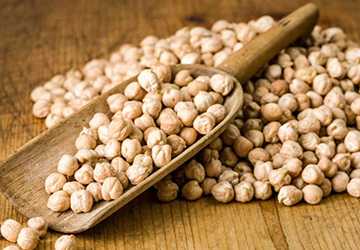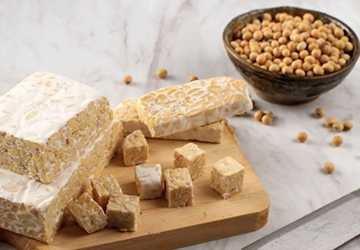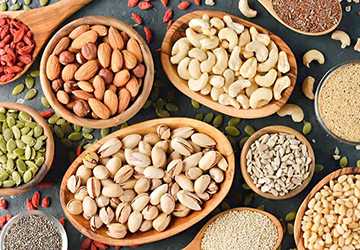Top 10 Protein Sources for a Plant-Based Diet
The rise of plant-based diets, known for their health and environmental benefits, has recently become a notable trend. Whether you're a committed vegetarian or want to incorporate extra plant-based dishes into your diet, ensuring you're getting enough protein is essential. Contrary to popular misconception, a plant-based diet is rich in protein, with many sources to choose from. This article explores the ten best protein sources for a plant-based diet that will satisfy your nutritional needs and delight your taste buds.
The rise of plant-based diets, known for their health and environmental benefits, has recently become a notable trend. Whether you're a committed vegetarian or want to incorporate extra plant-based dishes into your diet, ensuring you're getting enough protein is essential. Contrary to popular misconception, a plant-based diet is rich in protein, with many sources to choose from. This article explores the ten best protein sources for a plant-based diet that will satisfy your nutritional needs and delight your taste buds.
1. Lentils: A protein-rich food
Lentils are considered a significant force in the plant-based food space. These tiny beans are high in protein, fibre and essential nutrients, providing about 18 grams of protein per cup of cooked beans. Their adaptability makes them an excellent choice for anyone looking for plant-based protein, perfect for enhancing the flavour of soups, stews, and salads.

2. Chickpeas: The Versatile Legume
Chickpeas are a valuable source of plant protein. Just one cup of cooked chickpeas provides about 15 grams of protein. In addition to being famous as hummus, they can be roasted for a delicious crunch or sprinkled on salads to add texture and nutritional value. Chickpeas are a versatile option for health-conscious eaters.
3. Quinoa: Complete protein
Quinoa is often touted as a "complete protein" because it contains all nine essential amino acids. Quinoa is an excellent choice for a plant-based diet. One cup of cooked quinoa provides about 8 grams of protein and is rich in beneficial fibre and essential minerals.
4. Tofu: Soy Superfood
Tofu is made from soybeans, a versatile and protein-rich ingredient. It's often used in various plant-based dishes, from stir-fries to smoothies. The amount of protein in tofu varies, with some varieties having as much as 15 grams of protein per half cup. Tofu absorbs flavour quickly, making it an excellent base for culinary creations.

5. Tempeh: A source of fermented protein
Tempeh is an additional source of soy protein. What makes it unique is the fermentation process, which improves digestion and increases nutritional value. With 21 grams of protein per 4-ounce serving, tempeh is a rich and satisfying option for individuals seeking a boost of plant-based protein. Its nutty flavour and firm texture make it an excellent meat substitute in various recipes.
6. Beans: A cheap source of protein
Beans such as black beans, kidney beans, and pinto beans provide inexpensive, protein-rich options for those following a plant-based diet. One cup of cooked beans typically provides about 15 grams of protein. They can be used in various dishes, including burritos, chilli, and bean burgers.
7. Nuts and Seeds: On-the-Go Protein
Nuts and seeds are the perfect companion for anyone consuming protein and healthy fats on the go. For example, almonds provide 6 grams of protein per ounce, and pumpkin seeds provide about 9 grams per ounce. These portable snacks make protein on the go a breeze. You can also sprinkle some sugar granules on salads or muesli to give them an extra kick.

8. Spinach: Popeye's favourite protein source
Spinach is a leafy vegetable that is not only rich in iron but also contains a lot of protein. Containing approximately 5 grams of protein per cup of cooked protein, it is an excellent addition to any plant-based diet. Spinach is great in salads, smoothies, and stir-fries, adding nutrition and flavour.
9. Gluten: meaty vegetable protein
Gluten or, wheat or gluten-free meats are protein-rich meat alternatives. It's made from gluten (the protein in wheat) and has an impressive amount of protein, typically 20 grams per 3.5-ounce serving. Seitan can be roasted, sautéed or used in various meatless dishes to create a hearty, meaty texture.
10. Spirulina: super protein food
Spirulina is a remarkable blue-green algae that is not only a source of protein but also an excellent food. Just 1 ounce adds about 16 grams of protein. Whether in powder or tablet form, it can be easily mixed into smoothies or used as a natural food colouring. Spirulina doesn't just contain protein; It's a superhero that supports your overall health.
Incorporating these protein sources into your plant-based diet will ensure you meet your nutritional needs while enjoying different flavours and textures. Whether you're a seasoned vegetarian or just beginning to explore plant-based eating, plenty of delicious and protein-rich options exist.
Balance plant-based protein intake.
While these ten protein sources provide excellent additions to your plant-based diet, it's also essential to maintain a balanced nutritional approach. Combining different protein sources, such as legumes, grains, nuts, and seeds, can help you achieve a more balanced amino acid profile. Also, pay attention to portion sizes and total calorie intake, as it's easy to overdo it on a plant-based diet if you need to be more careful.
Tips for Maximizing Protein Intake
To ensure your body effectively absorbs the protein you consume, consider these tips:
Vary your diet: Include different plant foods to ensure you get various nutrients and amino acids.
Combine with supplemental protein: Combine foods like beans and rice to form an additional protein source that provides all the essential amino acids.
Add healthy fats: Add healthy fat sources like avocados and nuts to increase the absorption of fat-soluble vitamins and improve overall nutrient absorption.
Pay attention to timing: Spread your daily protein intake to support muscle repair and growth.
Stay Hydrated: Staying well hydrated is essential to ensure optimal nutrient absorption. Therefore, be sure to drink enough water.
Conclusion
A plant-based diet can be very nutritious and rich in protein if chosen correctly. By incorporating these top ten protein sources into your meals, you'll meet your protein needs and enjoy the countless health benefits of a plant-based diet. From lentils and chickpeas to tofu and spirulina, the plant-based world offers a variety of options to tantalize your taste buds while nourishing your body. So enjoy plant-based protein sources' taste and health benefits and discover the delicious options awaiting your plant-based journey.